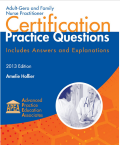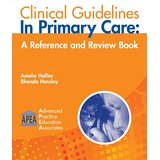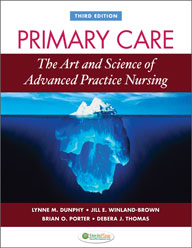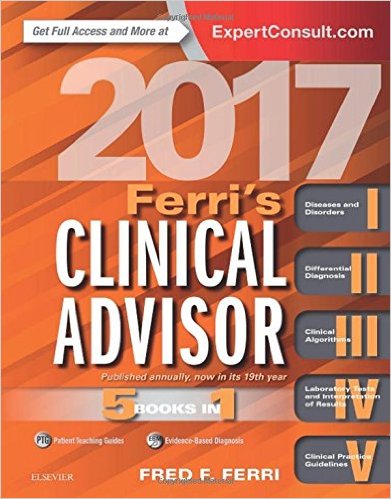| Course Number: | NR661 |
|---|---|
| Course Title: | Capstone Practicum |
| Course Credits: | 3 (0.5 didactic/2.5 clinical) |
| Prerequisite: | NR601, NR602, NR603 |
Syllabus
Overview
Course Description
The student will synthesize all elements of clinical management skills and knowledge and continue to analyze, apply, and evaluate diverse aspects of patient assessment and healthcare intervention. This precepted clinical practicum will be with an approved provider in an advanced practice setting. Focus topics include clinical management skills, case studies, chart reviews, and practice critique, with a capstone product evidencing increasing complex clinical management skills.
Textbooks and Resources
Required Textbooks
The following books are required for this course:

American Psychological Association. (2010). Publication manual of the American Psychological Association (6th ed.). Washington, DC: Author.
Recommended Textbooks

Ferri, F. F. (2014). Ferri’s clinical advisor 2014: 5 books in 1. Philadelphia: Mosby Elsevier.

Goroll, A., & Mulley, A. (2014). Primary care medicine: Office evaluation and management of the adult patient (7th ed.). China: Wolters Kluwer Health.

Hawkins, J. W., Roberto-Nichols, D. M., & Stanley-Haney, J. L. (2011). Guidelines for nurse practitioners in gynecologic settings (10th ed.). New York, NY: Springer Publishing Company.

Hollier, A. (2013). Adult-gero and family nurse practitioner certification practice questions: Includes answers and explanations. Scott, LA: Advanced Practice Education Associates, Inc.

Richardson, B. E. (2011). Pediatric primary care: Practice guidelines for nurses (2nd ed.). Sudbury, MA: Jones & Bartlett.

Dunphy, L. M., Winland-Brown, J. E., Porter, B. O., & Thomas, D. J. (2011). Primary care: The art and science of advanced practice nursing (3rd ed.). Philadelphia, PA: F.A. Davis.
Physical Books and Supplies
To obtain all your books and supplies, visit the online Chamberlain bookstore at https://bookstore.chamberlain.edu/.
eBook Details
First Time Using VitalSource?
Step 1: View the VitalSource Video
Step 2: Register with VitalSource Bookshelf Online
- Click the cover or title of your eBook. A new window will open.
- Enter email address and password. Bookshelf Online will open.
Step 3: Access the Desktop and Mobile Versions
You must complete Step 2 prior to using the desktop or mobile versions.
Already Registered? 3 Ways to Access Your eBooks

Online
Access your eBook by clicking on the book cover or title in the syllabus page. Bookshelf Online will open.

Desktop
Download your eBooks and use them whether you're connected to the Internet or not.

Mobile
Download the app and get your eBooks on your iPhone, iPad, or Android device.
Textbooks and Resources
Required Textbooks
The following books are required for this course:
The following book is required across all FNP courses:

American Psychological Association. (2010). Publication manual of the American Psychological Association (6th ed.). Washington, DC: Author.
The following book is recommended across all FNP courses:
Dunphy, L. M., Winland-Brown, J. E., Porter, B. O., & Thomas, D. J. (2015). Primary care: The art and science of advanced practice nursing (4th ed.). Retrieved from http://online.vitalsource.com
Ferri, F. F. (2017). Ferri’s clinical advisor 2017: 5 books in 1. Retrieved from http://online.vitalsource.com
Goroll, A. H., & Mulley, A. G. (2014). Primary care medicine: Office evaluation and management of the adult patient (7th ed.). China: Wolters Kluwer.

Hawkins, J. W., Roberto-Nichols, D. M., & Stanley-Haney, J. L. (2011). Guidelines for nurse practitioners in gynecologic settings (10th ed.). New York, NY: Springer Publishing Company.

Hollier, A. (2013). Adult-gero and family nurse practitioner certification practice questions: Includes answers and explanations. Scott, LA: Advanced Practice Education Associates, Inc.

Richardson, B. E. (2011). Pediatric primary care: Practice guidelines for nurses (2nd ed.). Sudbury, MA: Jones & Bartlett.

Hollier, A. (2016). Clinical guidelines in primary care (2nd ed.). Advanced Practice Education Associates.
.
Physical Books and Supplies
To obtain all your books and supplies, visit the online Chamberlain bookstore at https://bookstore.chamberlain.edu/.
eBook Details
First Time Using VitalSource?
Step 1: View the VitalSource Video
Step 2: Register with VitalSource Bookshelf Online
- Click the cover or title of your eBook. A new window will open.
- Enter email address and password. Bookshelf Online will open.
Step 3: Access the Desktop and Mobile Versions
You must complete Step 2 prior to using the desktop or mobile versions.
Already Registered? 3 Ways to Access Your eBooks

Online
Access your eBook by clicking on the book cover or title in the syllabus page. Bookshelf Online will open.

Desktop
Download your eBooks and use them whether you're connected to the Internet or not.

Mobile
Download the app and get your eBooks on your iPhone, iPad, or Android device.
Program Outcomes
Program Outcomes of Chamberlain nursing programs can be found in the Program Descriptions section of your College Catalog. You can access your College Catalog at http://www.chamberlain.edu/msncatalog.
The MSN program outcomes are aligned with the American Association of Colleges of Nursing publication, The Essentials of Master's Education in Nursing (2011). Upon completion of the MSN degree program, the graduate will be able to:
1
Practice safe, high-quality advanced nursing care based on concepts and knowledge from nursing and related disciplines.
2
Construct processes for leading and promoting quality improvement and safety in advanced nursing practice and healthcare delivery.
3
Use contemporary communication modalities effectively in advanced nursing roles.
4
Evaluate the design, implementation and outcomes of strategies developed to meet healthcare needs.
5
Develop a plan for lifelong personal and professional growth that integrates professional values regarding scholarship, service and global engagement.
6
Apply legal, ethical and human-caring principles to situations in advanced nursing practice.
7
Design patient-centered care models and delivery systems using the best available scientific evidence.
8
Manage human, fiscal and physical resources to achieve and support individual and organizational goals.
9
Compose a plan for systematic inquiry and dissemination of findings to support advanced nursing practice, patient-care innovation, and the nursing profession.
10
Collaborate interprofessionally in research, education, practice, health policy and leadership to improve population health outcomes.
11
Apply principles of informatics to manage data and information in order to support effective decision making.
Course Outcomes
Chamberlain College of Nursing courses are built to align course content with specific Course Outcomes (COs). The COs define the learning objectives that the student will be required to comprehend and demonstrate by course completion. The COs that will be covered in detail each week can be found in the Overview page in that particular week. Whenever possible, a reference will be made from a particular assignment or discussion back to the CO that it emphasizes.
Upon completion of this course, the student will be able to do the following.
1
Examine antibiotics, pharmacological, complementary, and non-pharmacological therapies for management of common health problems. (PO 1, 7)
2
Demonstrate health promotion, health protection, disease prevention, and treatment for pulmonary and hematology disorders. (PO 1, 7)
3
Demonstrate health promotion, health protection, disease prevention, and treatment for neurology and psychology disorders (PO 1, 7)
4
Demonstrate health promotion, health protection, disease prevention, and treatment for gastroenterology, urology disorders and sexually transmitted diseases. (PO 1, 7)
5
Demonstrate health promotion, health protection, disease prevention, and treatment for cardiovascular and endocrinology disorders (PO 1, 7)
6
Demonstrate health promotion, health protection, disease prevention, and treatment for orthopedics, dermatology, and EENT (Eyes, Ears, Nose, Throat) disorders. (PO 1, 7)
7
Demonstrate health promotion, health protection, disease prevention, and treatment for men’s health, women’s health, reproductive and pregnancy (PO 1, 7)
8
Demonstrate health promotion, health protection, disease prevention, and treatment in infants, children and adolescents. (PO 1, 7)
9
Reflect on personal and professional growth toward achieving competence as a family nurse practitioner. (PO 5, 10)
10
Demonstrate patient-centered care through the nurse practitioner patient relationship in selected healthcare delivery settings. (PO 1, 2, 3, 6)
11
Exemplify a commitment to the professional role of the family nurse practitioner when providing care in selected healthcare delivery settings. (PO 2, 4, 5, 7, 9, 10)
Course Schedule
| Week, COs, and Topics | Readings | Assignments |
|---|---|---|
Week 1 COs 2 & 10 Pulmonary and Hematology Review | Advanced Practice Education Associates (APEA) Pulmonary and Hematology Review Modules |
|
Week 2 COs 1, 3, 10 Neurology and Psychology Review | APEA Neurology, Antibiotics, and Psychology Modules |
|
Week 3 COs 4, 10 Gastrointestinal, Urological, and Sexually Transmitted Disease Review | APEA Gastrointestinal, Urological, and Sexually Transmitted Disease Modules |
|
Week 4 COs 5, 10 Cardiovascular and Endocrine Review | APEA Cardiovascular and Endocrine Modules |
|
Week 5 COs 7, 10 Men and Women’s Health and Pregnancy Review | APEA Men and Women’s Health and Pregnancy Modules |
|
Week 6 COs 6, 10 Orthopedics, Dermatology, and EENT (Eyes, Ears, Nose, Throat) Review | APEA Orthopedics, Dermatology, and EENT (Eyes, Ears, Nose, Throat) Modules |
|
Week 7 COs 8, 9, 10 Pediatric Review | APEA Pediatrics 1 & 2 and Growth and Development Modules |
|
Week 8 CO 11 Preparing for the National Board Certification Exam and Entry Into Practice |
|
A passing grade, or S, must be achieved on the clinical performance evaluation. If this is achieved and the 125 clinical hours are documented, the 250 points will be added to the remainder of the course points to calculate the final course grade. If the student does not achieve a passing grade (fail) for the clinical performance evaluation, then the final course grade assigned will be F.
Late Assignment Policy
Students are expected to submit assignments by the time they are due. Assignments submitted after the due date and time will receive a deduction of 10% of the total points possible for that assignment for each day the assignment is late. Assignments will be accepted, with penalty as described, up to a maximum of three days late, after which point a zero will be recorded for the assignment.
In the event of an emergency that prevents timely submission of an assignment, students may petition their instructor for a waiver of the late submission grade reduction. The instructor will review the student’s rationale for the request and make a determination based on the merits of the student’s appeal. Consideration of the student’s total course performance to date will be a contributing factor in the determination. Students should continue to attend class, actively participate, and complete other assignments while the appeal is pending.
This Policy applies to assignments that contribute to the numerical calculation of the course letter grade.
Evaluation Methods
Evaluation Methods
The maximum score in this class is 1,000 points. The categories, which contribute to your final grade, are weighted as follows.
| Graded Item | Points | Weighting |
|---|---|---|
Reflection Discussion (20 points per week; required Weeks 2-6) | 100 | 10% |
APEA MyQBank Weekly Practice Questions (30 points per week; required Weeks 1-7) | 210 | 21% |
| Professional Portfolio (Week 7) | 100 | 10% |
APEA Online Completion Certificate (due Week 8) | 40 | 4% |
Clinical Encounter Log (due Weeks 1–8) Clinical Performance Evaluation (Week 8) Pass on final clinical performance evaluation and documentation of 125 hours* = 250 points Fail on clinical performance evaluation or less than 125 hours documented*=0 points *A maximum of fifteen (15) alternative hours is allowed in each FNP clinical course. The alternative hours can only be documented in the three (3) approved categories (1. Lab review 2. Telephone management 3. Prescription refills). | 250 | 25% |
Comprehensive Program Final Exam (Week 8) Students will take a comprehensive capstone exam. A 70% or better is needed on this exam to earn 300 points. A student who score less than 70%, will be allowed to retest one time at the student's expense between Thursday - Saturday of Week 8. Any student who score less than 70% on the 2nd exam attempt of the comprehensive capstone final exam may request an incomplete (if all other course requirements have been met) and enter Chamberlain's six-week tutoring program the following session. Tutoring Program: At the completion of the six-week tutoring program, the student earned grade for NR661 will be based on the NR661 Week 8 APEA retake exam's score from the APEA testing Center (www.apeaotc.com). Score of 65-69% = 150 points Score of 64% and below = 100 points | 300 | 30% |
| Total | 1,000 | 100% |
No extra credit assignments are permitted for any reason.
All of your course requirements are graded using points. At the end of the course, the points are converted to a letter grade using the scale in the table below. Percentages of 0.5% or higher are not raised to the next whole number. A final grade of 76% (letter grade C) is required to pass the course.
| Letter Grade | Points | Percentage |
|---|---|---|
| A | 940–1,000 | 94% to 100% |
| A- | 920–939 | 92% to 93% |
| B+ | 890–919 | 89% to 91% |
| B | 860–889 | 86% to 88% |
| B- | 840–859 | 84% to 85% |
| C+ | 810–839 | 81% to 83% |
| C | 760–809 | 76% to 80% |
| F | 759 and below | 75% and below |
NOTE:To receive credit for a week's discussion, students may begin posting no earlier than the Sunday immediately before each week opens. Unless otherwise specified, access to most weeks begins on Sunday at 12:01 a.m. MT, and that week's assignments are due by the next Sunday by 11:59 p.m. MT. Week 8 opens at 12:01 a.m. MT Sunday and closes at 11:59 p.m. MT Wednesday. Any assignments and all discussion requirements must be completed by 11:59 p.m. MT Wednesday of the eighth week.
Students agree that, by taking this course, all required papers may be subject to submission for textual similarity review to Turnitin.com for the detection of plagiarism. All submitted papers will be included as source documents in the Turnitin.com reference database solely for the purpose of detecting plagiarism of such papers. Use of the Turnitin.com service is subject to the Terms and Conditions of Use posted on the Turnitin.com site.
Participation: NR661
In NR661, you will be participating in a discussion during Weeks 2-6. This discussion is intended for you to reflect on your individual study plan and identify areas of content that you may still need to review prior to your certification exam. The initial discussion post is due by Wednesday, 11:59 p.m. MT during the week. You are also required to respond to a minimum of one student peer and answer any instructor follow-up questions that may be posted by Sunday, 11:59 p.m. MT. You must post on two or more separate days.
You will also be required to complete questions in the APEA Qbank (graded - exam mode) during Weeks 1-7. These practice questions are intended to prepare you for the final exam as well as the national certification exam. You are expected to practice exams (assigned weekly topic exams), random 150 question exams, and review exam questions missed a minimum of three (3) days weekly between Monday – Sunday. To be successful, consider making time to also practice exams in tutor mode (recommended – not graded).Webliography Disclaimer
The purpose of the Webliography is to provide students with annotated bibliographies of world wide websites relevant to their courses. These websites are not meant to be all inclusive of what is available for each course's subjects and have not been sanctioned as academically rigorous or scholarly by Chamberlain College of Nursing. Please exercise caution when using these websites for course assignments and references.


